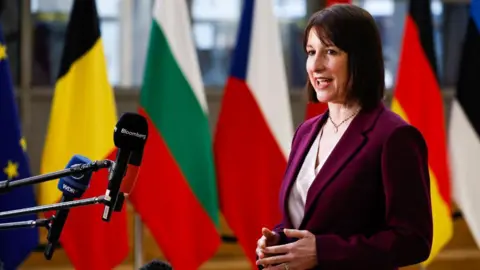 Getty Images
Getty ImagesCloser relations between the UK and the European Union (EU) will boost economic growth, Chancellor Rachel Reeves has told finance leaders in Brussels.
In the first address by a British chancellor to the Eurogroup since Brexit, Reeves said a “reset” in relations would mean “breaking down barriers to trade” as well as helping “businesses sell in each other’s markets”.
While Labour has ruled out re-joining the trade bloc, it has repeatedly said it wants the UK to “deepen ties” with the EU.
The Conservatives accused Labour of “follow[ing] EU rules for nothing in return”.
Speaking after the meeting with finance ministers, Reeves said she wanted “a more business-like relationship” between the UK and the EU, but declined to say exactly which parts of the UK’s relationship with the EU she wanted to change.
“Today was not about starting a negotiation… today was about rebuilding relations,” she said, adding that negotiations would begin “in the new year”.
The EU has said it would like to see a scheme for young Europeans to live and work both there and in the UK – something Prime Minister Sir Keir Starmer has ruled out in the past.
Meanwhile, the UK has previously said it is seeking a veterinary agreement, which could mean meat, fish, dairy, and live animals face fewer checks when crossing a UK-EU border.
Closer alignment to European food standards could also complicate any attempt by the UK to forge closer relations with the US on Donald Trump’s re-entry into the White House in January.
The British Chambers of Commerce (BCC), which represents about 50,000 businesses, said that in order for the economy to grow “we must export more” but UK firms “are struggling under huge regulatory and paperwork burdens”.
Ahead of the chancellor’s speech, shadow business secretary Andrew Griffith urged her to “jump on a plane to the US and talk to [President-elect] Trump about getting a US-UK trade deal done, not trying to take Britain backwards into the slow growth EU.”
But Liberal Democrat Treasury spokesperson Daisy Cooper said: “The Conservatives’ botched Brexit deal has been a disaster for the economy, with small businesses, farmers and fishers all caught up in endless red tape.”
In Brussels, German finance minister Jörg Kukies said it was “in our national interest to have more normal trading relations with our nearest neighbours and trading partners”.
Spanish finance minister Carlos Cuerpo said: “There’s a win-win situation of going further in this relationship between both parties, and we need to engage.”
Eelco Heinen, the Dutch finance minister, described the UK as an important trade partner, but he added: “I’m not going to renegotiate Brexit.”
Last month, in a highly unusual move, the governor of the Bank of England, Andrew Bailey, said that the UK must “rebuild relations” with the EU.
The governor has avoided commenting on Brexit because of the Bank’s independence from Westminster politics.
“The impact on trade seems to be more in goods than services,” Mr Bailey said.
“But it underlines why we must be alert to and welcome opportunities to rebuild relations while respecting that very important decision of the British people.”
The export of goods, such as in food and farming, has been impacted by new trade barriers. But services, including banking, have performed better than expected.
Labour has said it is committed to implementing post-Brexit agreements struck under the previous Tory government.
These include the Windsor Framework, which covers trade between the UK and Northern Ireland.
But Reeves told finance ministers in Brussels: “The reset in relations is about doing what is in the best interests of our shared economies and those that depend on it.
“That means breaking down barriers to trade, creating opportunities to invest and helping our businesses sell in each other’s markets.”
Reeves’s speech came at a key time for both the UK and European economies after President-elect Donald Trump threatened to impose tariffs of up to 20% on all goods imported into the US.
Carsten Brzeski, global head at financial services company ING Research, told the BBC’s Today programme that European leaders “clearly” had an interest in working more closely with the UK government as a result of Trump’s election.
He said that potential tariff changes could prove a “threat” to European economies such as Germany, who export a great deal of goods to the US.
“It’s also about Donald Trump’s idea to cut taxes and do deregulation in the US. That could also make the US economy much more attractive than the EU economy and could somewhat cannibalise the growth potential of Europe,” Mr Brzeski said.

